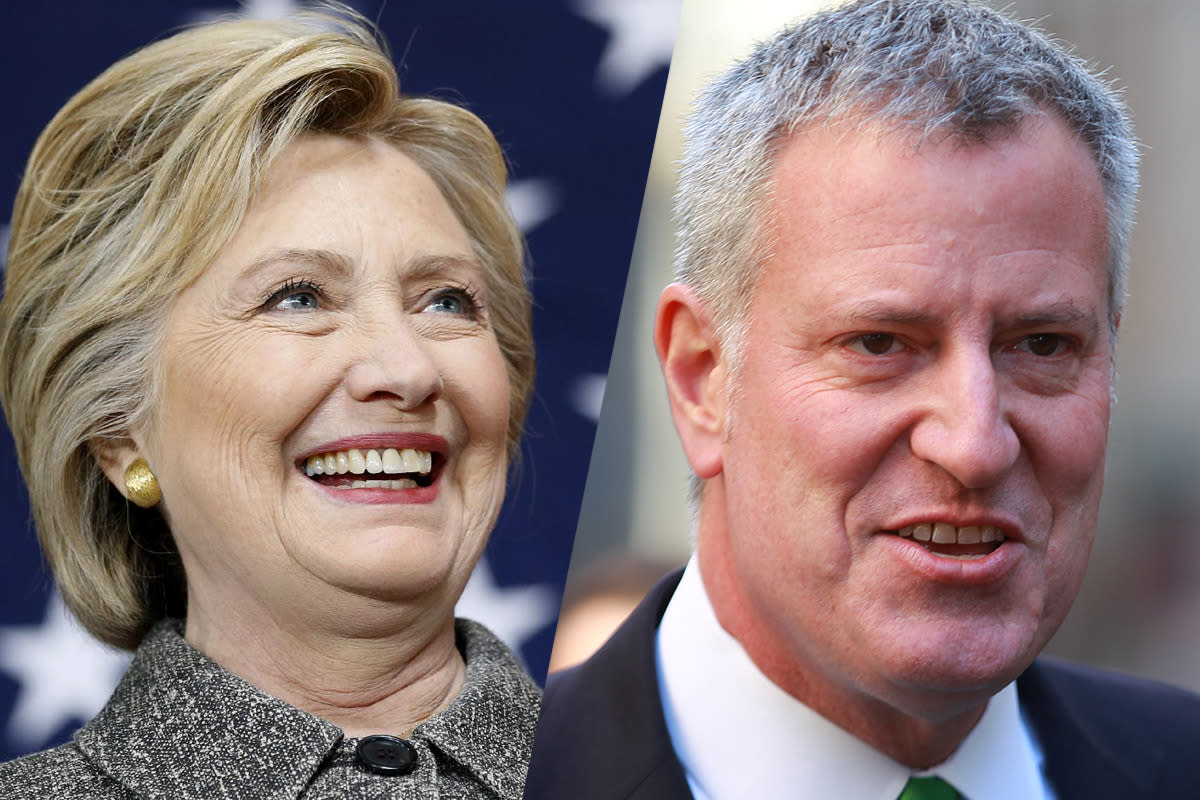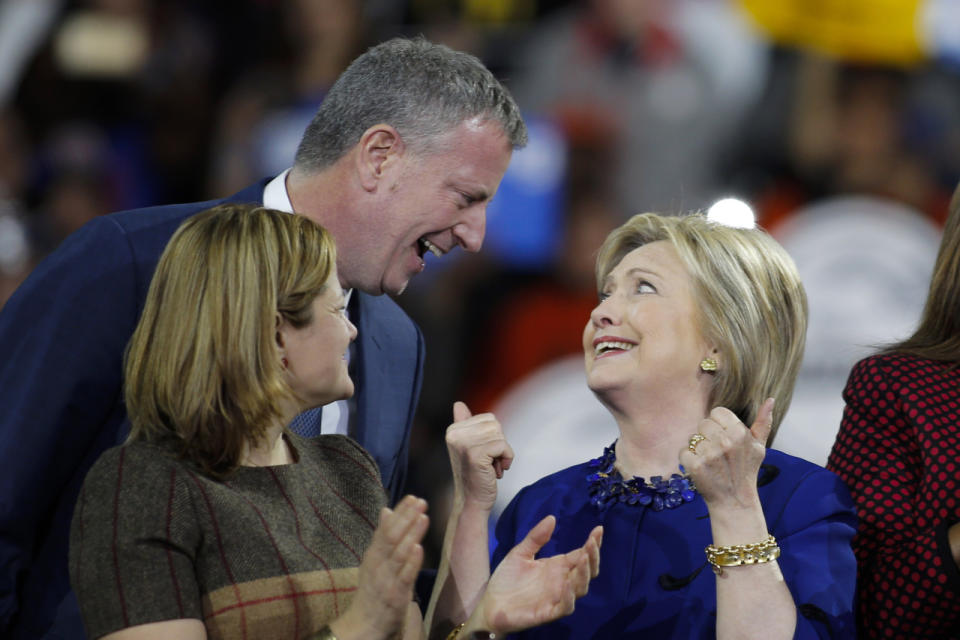Bill de Blasio steps into his new role as a Clinton campaign surrogate

Democratic presidential candidate Hillary Clinton and New York City Mayor Bill de Blasio. (Photos: Patrick Semansky/AP; Gordon Donovan/Yahoo News)
New York City Mayor Bill de Blasio defended Hillary Clinton against criticism that she has taken money from members of the oil and gas industry in a press conference call hosted by her campaign on Friday afternoon. De Blasio touted his own reputation as a progressive leader and claimed the argument that Clinton is too cozy with the industry is false.
“I’m a progressive, and I tell you this one doesn’t hold water,” de Blasio said.
De Blasio, who worked as a political operative before running for office himself, managed Clinton’s U.S. Senate campaign in 2000. As a result of this relationship and the fact that the mayor has attempted to position himself as a national progressive voice, these are words political observers in New York and Washington, D.C., might have expected to hear from him far earlier in the primary campaign as Clinton weathered criticism that she’s insufficiently progressive from her rival, Sen. Bernie Sanders, I-Vt. However, Friday’s conference call was the first time de Blasio headlined a public event as an official Clinton campaign surrogate,
Both Hillary and Bill Clinton attended de Blasio’s mayoral inauguration in 2014. At the ceremony, President Clinton swore de Blasio in on the steps of City Hall. Given de Blasio’s ties to the Clintons and his status as one of the more high-profile figures in the left wing of the Democratic Party, his role (or lack thereof) in Clinton’s campaign thus far has drawn substantial scrutiny.
It took more than six months for de Blasio to endorse Clinton after she entered the presidential race. During what the New York Times described as his “slow, awkward march” toward backing her, de Blasio repeatedly suggested he needed to see more details of her platform to ensure it was truly progressive. De Blasio finally endorsed Clinton late last October.
At the end of January, de Blasio traveled to Iowa to campaign for Clinton ahead of the caucuses in the Hawkeye State. However, he was not an official campaign surrogate and did not appear alongside Clinton.
De Blasio told the New York Times the Clinton campaign declined his initial offer to travel to the state on her behalf. Instead of acting as a surrogate, de Blasio knocked on doors and called voters unaccompanied by any member of Clinton’s team. Politico described the spectacle of the mayor doing what was essentially grunt work normally reserved for low-level volunteers as “awkward” and openly speculated whether he was paying “penance” for his slow endorsement of Clinton.
The Clinton campaign told Yahoo News that de Blasio’s first official public appearance with the campaign came when he spoke at a fundraiser for her at Radio City on March 2. It did not respond to a question about whether the press conference call on Friday indicated that the mayor will take on a greater public role in the campaign ahead of the New York primary on April 19.

Bill de Blasio speaks with Hillary Clinton after a rally in New York City. (Photo: Eduardo Munoz Alvarez/Getty Images)
On Friday’s call, Yahoo News asked de Blasio why he had not participated in public events with the Clinton campaign earlier in the race. De Blasio said that was a “question for them.” He also pointed out that he has regularly offered praise for Clinton since she “put out the fullness of her platform.
“I’ve been talking to the campaign since early 2015 on a very consistent basis, and I’ve constantly spoken up about what I thought was impressive about Hillary Clinton, why I thought she had more experience as a candidate and more qualifications as a candidate than anyone — almost anyone who’s run for president,” de Blasio said, adding, “I’ve been a campaign manager. A campaign has lots of decisions it has to make about how it’s approaching each state, who they’re working with in each place. That’s a question for them, but I can tell you I’ve been very comfortable speaking up for her.”
The conference call came together as a result of a conversation de Blasio had with the Clinton campaign staff on Friday morning. De Blasio said they discussed the attacks Clinton has faced for taking donations from employees of oil and gas companies, and he offered to “address it.”
Clinton’s contributions from members of the oil and gas industry were thrust into the spotlight on Thursday after she had a contentious exchange with a Greenpeace activist about the issue on the rope line following a campaign event. After the activist asked Clinton to “reject fossil-fuel money,” Clinton responded that she was “sick of the Sanders campaign lying about me.”
Greenpeace’s research found that as of last month, Clinton’s campaign had received more than $300,000 from employees of oil and gas companies. The organization also found lobbyists registered as representing the industry had given more than $1 million to her campaign and “large donors connected to the fossil fuel industry” had given more than $3 million to a super-PAC dedicated to supporting Clinton. In contrast, a fact-check conducted late last year found that the Sanders campaign had received about $54,000 from employees of oil and gas companies. Sanders does not have a super-PAC. The Sanders campaign has issued multiple public statements highlighting these contributions to Clinton.
In a television interview on Friday, Sanders claimed that Clinton “has taken significant money from the fossil-fuel industry.” Sanders’ campaign has pledged to return any contributions from employees of oil and gas companies. However, the Washington Post published a fact-check on Saturday that accused Sanders and his team of “exaggerating the contributions that Clinton has received from the oil and gas industry.” The newspaper noted that the money from employees of the industry given to Clinton’s campaign and super-PAC amounts to “only 2 percent of the total contributions received by Clinton and outside groups backing her.” Additionally, the Washington Post fact-check pointed out that many of the lobbyists included in Greenpeace’s research represent multiple industries.
“In the context of her overall campaign, the contributions are hardly significant,” the paper’s fact-check said. “It’s especially misleading to count all of the funds raised by lobbyists with multiple clients as money ‘given’ by the fossil-fuel industry.”
On the conference call Friday, de Blasio argued that a relatively “small number of individuals” employed by oil and gas companies have given to Clinton’s campaign. He also said it would be unfair to “lump in” money given to her super-PAC. De Blasio suggested the discussion should focus on Clinton’s platform. He described her policies as “quite sharp” on both fossil fuels and Wall Street regulation, another area where she has faced attacks from Sanders for her industry ties.
“I would also note her platform calls clearly for an end to tax breaks to fossil-fuel companies and like her positions on Wall Street, where her policies, her vision for reining in Wall Street is stronger than Sen. Sanders’ … she is being very clear in her platform,” de Blasio said. “She is being quite sharp in her platform about the fact that those tax breaks have to end, and the focus has to be on renewable energy and the jobs that will come with it.”
De Blasio criticized the Sanders campaign for highlighting Clinton’s donations from people with ties to oil and gas companies.
“I have many times praised Sen. Sanders for some of the ideas he’s put forward and some of the ways he has moved the discussion in this country in a positive direction,” de Blasio said. “But this attack is not becoming of him, and it’s not becoming of that movement to bring about more progressive change, and I think we should just get back to the issues.”

